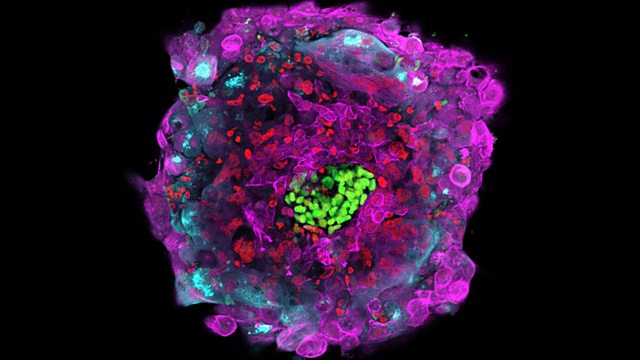
Human Embryos
Human Embryos; Edible Bale Wrapping; Inspirational Managers May Harm Workers’ Health; Fat Labradors; Our Unnatural Selection; Activity Tracker Stops Hospital Admission
In a major advance in the field of embryology, scientists this week have kept human embryos alive in petri dishes for record amounts of time. The legal limit for keeping fertilised human embryos in the lab is 14 days, a cut-off point set in 1979. Back then, scientists were able to keep embryos alive for only a few days, meaning the limit was only a theoretical one. Advances mean that this week, in two papers, researchers have reached that limit. Professor Ali Brivanlou, Robert and Harriet Heilbrunn Professor of Stem Cell biology and molecular embryology at Rockefeller University is lead author on one of the papers, and Professor Bobbie Farsides is a clinical and biomedical ethicist at Brighton and Sussex Medical School. They join Adam Rutherford to discuss the next steps for embryology. Should this limit curtail research?
Edible Bale Wrapping
Did you know that hay, straw and silage bales are often bound in plastic? This needs to be removed before the bales can be used for livestock food and bedding. The process is arduous, and the waste, non-biodegradable - plastic ends up in a landfill. The plastic is also potentially harmful, or fatal, to livestock, if accidentally ingested. It is a problem a group of young chemists at Imperial College London set their minds to and they have come up with an ingenious and secret formula for edible hay bale wrapping.
Are Inspirational Managers Bad For Our Health?
Having an inspirational boss can help to encourage employees to succeed. A new study on Danish postal workers found that people who work for so-called transformational managers actually take more time off sick in the long-term. The Danish postal service is looking to diversify – as fewer letters are sent they want to find other local jobs for their postmen and women. But staff seem so keen to please their bosses or not to let the rest of the team down that they apparently go to work when they are ill. Karina Neilsen, who is Professor of Work and Organisational Psychology at the University of East Anglia led the study. She says that managers should be thinking about their workers’ health and wellbeing as well as trying to improve productivity – to protect their long-term health.
Fat Labradors
Most dog lovers will know that Labradors are particularly keen to eat anything, all the time, at any time. As a result, some are a bit corpulent, even obese. The cause is likely to be in their genes. A new study in the current issue of Cell Metabolism has identified that genetic basis for the perpetual hunger. Eleanor Raffan from Cambridge University, geneticist and vet, led the study. She explains to Adam Rutherford how she gathered a cohort of dogs.
Unnatural Selection
Humans have been altering animals for millennia. We select the most docile livestock, the most loyal dogs, to breed the animals we need. This "artificial selection" is intentional. But as Adam Hart discovers, our hunting, fishing and harvesting are having unintended effects on wild animals. Welcome to the age of "unnatural selection".
Activity Tracker Stops Hospital Admission
Doctors in an ER in New Jersey in the US have used a patient’s Fitbit activity tracker to decide on treatment. The patient had Atrial Fibrillation, the condition where you have an irregular and often racing heartbeat. Emergency physician Alfred Sacchetti and his team needed to know when the problem had come on. But the patient had no idea, which was tricky because knowing when the heartbeat went awry determines whether or not the team administers an electric shock to reset the heart or if the patient needs weeks of treatment and hospital admission. Fortunately one of the nurses found the patient was wearing a Fitbit tracker and the data on his phone allowed doctors to reset his heart rhythm and send him home. Alfred Sacchetti explains more to Gareth Mitchell
(Image caption: This microscope photo provided by The Rockefeller University shows a human embryo 12 days after fertilization in vitro, with different cell types marked by separate colours © Gist Croft, Alessia Deglincerti, Ali H. Brivanlou/The Rockefeller University via AP)
The Science Hour was presented by Claudia Hammond with comments from Melissa Hogenboom of ����ý Earth
Producer: Rami Tzabar
Last on
More episodes
Previous
Broadcasts
- Sat 7 May 2016 08:06GMT����ý World Service Australasia
- Sat 7 May 2016 22:06GMT����ý World Service except News Internet
- Sun 8 May 2016 01:06GMT����ý World Service Australasia
- Mon 9 May 2016 05:06GMT����ý World Service South Asia
Podcast
-
![]()
Unexpected Elements
The news you know, the science you don't

